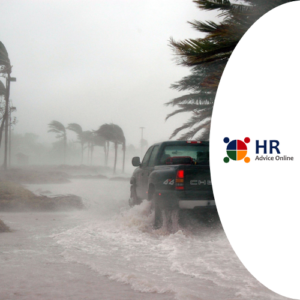Australia has beautiful weather that often keeps us guessing. The harsh reality is that we are a nation of extreme weather from drought to flooding rains. Did you know that when there is a natural disaster, such as a bushfire or flood, other rules under the Fair Work Act may apply. In inclement weather it may be unsafe or unreasonable for an employee to work because of severe weather conditions. Severe weather conditions may include heavy rain, storms, extreme heat or cold, hail, snow or high winds for example.
Under these difficult conditions, you may need to direct your employees not to attend, or to stop work. Some awards, enterprise agreements and other registered agreements include rules that deal with inclement weather. As an employer you should ensure you are familiar with the applicable industrial instrument/s and the inclement weather provisions. They will set out what inclement weather includes, employees and employers need to do when there is inclement weather employees need to be paid.
Under the Fair Work Act, employers can stand down employees without pay when they can’t be usefully employed in certain circumstances. This includes where there is a stoppage of work caused by natural disasters, such as bushfires or floods.
Employers can’t stand an employee down just because the business is quiet or there isn’t enough work due to bad weather. Find out more about what rules and responsibilities apply at Stand downs.
Before standing down an employee under the Fair Work Act, you should consider all other options available. These might include:
- inviting employees to take a period of accrued paid leave (for example, annual leave)
- requiring employees to take annual leave (if their award or agreement allows it, or if the employee isn’t covered by an award or agreement, and the requirement is reasonable)
- if there are multiple worksites and not all sites are affected, consider voluntary work sharing arrangements (for example, employees working at sites that aren’t affected by the natural disaster may offer to take paid leave while their position is temporarily filled by someone from an affected site)
- flexible working arrangements, like working from home.
Any arrangement to change an employee’s working patterns needs to be made in accordance with the Fair Work Act and the requirements in any award or agreement that applies.
Natural disasters can cause devastation to communities, businesses and individuals. They are more serious and widespread than severe or inclement weather. They can include bushfires, floods and cyclones. An employee may have entitlements under their award or agreement that are relevant if they can’t attend work because of an emergency or natural disaster.
Employees may want to volunteer to help their community with disaster relief and recovery activities through recognised emergency management bodies. For example, the State Emergency Service (SES) or Country Fire Authority (CFA). Most award and agreements have provision for community services leave. Please ensure you know what entitlements your employees may have to access this leave provision.
For understanding your obligations during natural disasters and emergencies please contact us at [email protected] or 1300 720 004.
Information in HR Advice Online guides and blog posts is meant purely for educational discussion of human resources issues. It contains only general information about human resources matters and due to factors, such as government legislation changes, may not be up to date at the time of reading. It is not legal advice and should not be treated as such.





